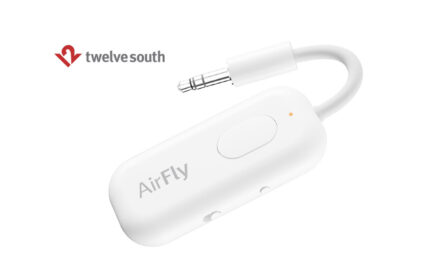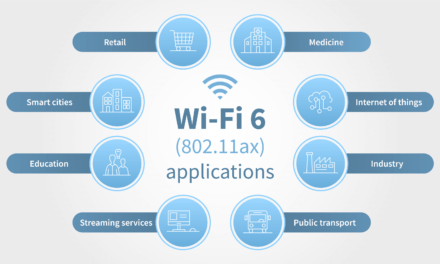
AI in Healthcare: Transforming the Future of Medicine

Artificial Intelligence (AI) is no longer a futuristic concept; it’s a transformative reality reshaping industries across the globe. AI’s impact is particularly profound in the healthcare sector, offering unprecedented opportunities to enhance patient care, reduce costs, and drive innovation. From predictive analytics to personalized treatment plans, AI is revolutionizing how healthcare is delivered, making it more efficient, accessible, and personalized.
The integration of AI in healthcare is multifaceted, encompassing various domains such as diagnostics, treatment planning, administrative tasks, and patient engagement. AI-powered algorithms can analyze vast amounts of data, detect patterns, and make predictions that human minds might overlook. This ability to harness big data is leading to breakthroughs in early disease detection, personalized medicine, and even mental health support.
The adoption of AI in healthcare is not without challenges. Ethical considerations, data privacy, regulatory compliance, and potential biases are some of the critical issues that must be addressed. As we stand on the brink of a new era in medicine, this article will explore key trends, challenges, opportunities, and future prospects of AI in healthcare. The intent is to provide insights into how AI is transforming the healthcare landscape, the potential hurdles, and the promising future that awaits.
Table of Contents
Benefits and Opportunities of AI in Healthcare
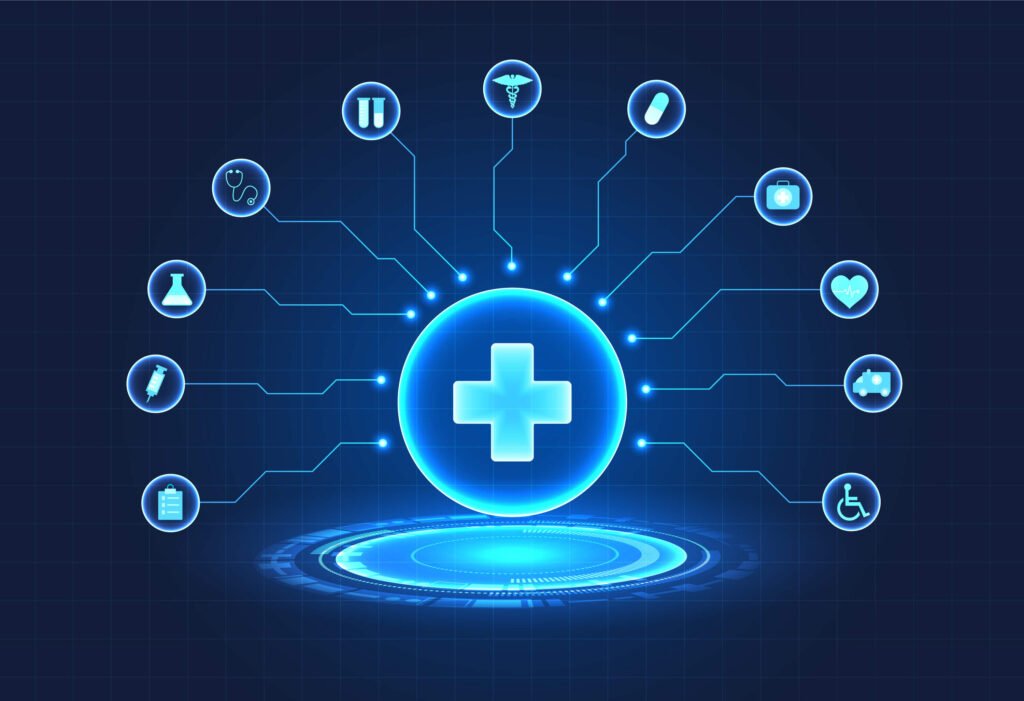
The benefits and opportunities of AI in healthcare are vast and transformative, reflecting the growing integration of AI across various aspects of healthcare. From enhancing diagnostics and treatment to personalizing care and improving operational efficiency, AI offers a range of benefits that can revolutionize healthcare delivery. AI algorithms can analyze complex medical data, provide real-time insights, support clinical decision-making, and enable more accessible and cost-effective care. A report by Accenture outlines the potential benefits of AI in healthcare, including improved patient outcomes, reduced costs, and enhanced healthcare experiences (source).
The opportunities for leveraging AI in healthcare extend beyond clinical care to research, administration, public health, and patient engagement. The potential for AI to support preventive care, enhance patient empowerment, drive medical research, and foster collaboration between healthcare stakeholders offers a glimpse into the future of healthcare, where technology is leveraged to create a more responsive, innovative, and patient-centered system.
Looking to the future, the benefits and opportunities of AI in healthcare hold immense promise for shaping a healthcare system that is not only technologically advanced but also aligned with the needs and values of patients and society. As technology advances, as collaboration grows, and as our understanding of the potential and challenges of AI deepens, the possibilities for leveraging AI to enhance healthcare in innovative, responsible, and compassionate ways become a tangible reality. This future reflects a broader shift towards a more connected, personalized, and dynamic healthcare landscape, where AI is leveraged to enhance care, empower patients, and foster a more equitable and accessible global healthcare community.
Personalized Medicine: Tailoring Treatment to the Individual
Personalized medicine represents a paradigm shift in healthcare, moving away from a one-size-fits-all approach to a model that tailors treatment to the individual patient. AI plays a pivotal role in this transformation by analyzing vast amounts of data, including genetics, lifestyle, and medical history. For example, IBM Watson’s Oncology platform (now Merative) leverages AI to recommend personalized cancer treatment plans, considering individual genetics and medical history (source). This ability to create highly personalized treatment plans increases the effectiveness of treatments and reduces side effects, leading to improved patient outcomes.
The integration of AI in personalized medicine also extends to the development of new pharmaceuticals and therapies. By utilizing AI algorithms to analyze complex biological data, researchers can identify potential drug targets and pathways more efficiently (source). This accelerates the drug discovery process, allowing for the development of medications that are tailored to specific genetic mutations or disease subtypes. For example, AI-driven analysis of genomic data can lead to the discovery of targeted therapies for rare genetic disorders, providing hope and treatment options for patients who previously had limited choices. This innovative approach to drug development, fueled by AI, represents a significant advancement in personalized medicine, opening new doors for individualized treatment and a more profound understanding of human biology.
But AI’s role in personalized medicine doesn’t stop at treatment. It’s also being used to predict individual health risks and recommend preventive measures tailored to each patient’s unique profile. This proactive approach to healthcare can help prevent illnesses before they start and manage chronic conditions more effectively. Whether it’s through personalized monitoring plans for chronic disease management or AI-powered algorithms that can predict health risks, the integration of AI into personalized medicine is fostering a healthcare system that’s more responsive to the individual needs and preferences of each patient.
Early Disease Detection: A Proactive Approach
Early disease detection is a critical component of modern healthcare, and AI is playing a transformative role in making it more precise and proactive. By analyzing medical images, patient records, and other data, AI algorithms can detect subtle signs of diseases that might be overlooked by human eyes. Google’s DeepMind, for example, developed an AI model that detects eye diseases in scans, allowing early intervention and treatment, potentially saving sight (source). This ability to detect diseases at an early stage, even before symptoms appear, represents a shift from reactive healthcare to a more preventive and proactive approach.
By identifying diseases like diabetes, heart disease, or cancer at their onset, AI enables interventions that can halt or slow disease progression. This early action not only reduces mortality rates but also enhances the overall quality of life for patients. Furthermore, the financial implications are significant, with potential reductions in healthcare costs through the avoidance of expensive late-stage treatments and hospital stays. The shift towards early detection aligns healthcare with a preventive model, emphasizing the importance of early intervention.
As technology evolves and more data becomes accessible, the potential for early disease detection through AI will likely grow. The success of this endeavor will depend on collaborative efforts between healthcare providers, tech companies, researchers, and public health authorities. Together, they can harness AI’s power to create a healthcare system that prioritizes prevention and early intervention. This proactive approach to healthcare, facilitated by AI, sets the stage for a future where health equity and preventive care are central, promising a healthier and more balanced society.
Enhanced Diagnostics: Accuracy and Efficiency
Enhanced diagnostics through AI is revolutionizing the way healthcare professionals diagnose and treat various medical conditions. By employing sophisticated algorithms that analyze medical images, laboratory results, and patient records, AI can identify patterns and anomalies with remarkable accuracy. A prime example of this innovation is Nanox’s (formerly Zebra Medical Vision) AI algorithms, which analyze medical imaging to identify various medical conditions accurately, enhancing diagnostic precision (source). This level of accuracy not only reduces human error but also improves patient outcomes by ensuring that the right diagnosis is made at the right time.
The influence of AI on diagnostics is not confined to accuracy alone; it also encompasses efficiency and broader accessibility. Traditional methods of diagnosis can be slow and dependent on specialized knowledge. AI-powered diagnostic tools are transforming this landscape by speeding up the process and ensuring consistency (source). This newfound efficiency is especially vital in areas with limited resources or access to specialized diagnostic expertise. By leveling the playing field, AI is making high-quality healthcare diagnostics available to a wider population, breaking down previous barriers.
The integration of AI into diagnostics is more than a technological advancement; it’s a fundamental shift towards a more collaborative and data-driven healthcare system. Decisions are no longer solely based on human judgment but are informed by comprehensive and precise information provided by AI algorithms. This shift ensures that the right diagnosis is made at the right time, enhancing patient outcomes. It sets the stage for a future where diagnostics are not merely tools for disease identification but integral components of a responsive, patient-focused healthcare system.
Cost Reduction: Streamlining Operations
Cost reduction is a critical concern in healthcare, and AI is playing a vital role in achieving this goal by streamlining operations and optimizing resources. By automating administrative tasks, managing workflows, and enhancing decision-making processes, AI is making healthcare operations more efficient and cost-effective. Olive AI, for example, automates administrative tasks in hospitals, reducing labor costs and errors, and streamlining operations (source). This automation not only leads to significant cost savings but also allows healthcare providers to focus more on patient care, enhancing the overall healthcare experience.
From optimizing resource allocation to minimizing waste and enhancing the use of facilities and equipment, AI’s influence is profound. Predictive algorithms that manage patient flow, staff scheduling, and supply chain optimization are just a few examples of how AI can trim operational costs. Moreover, AI’s precision in diagnostics and personalized treatment plans minimizes unnecessary procedures and hospital stays, further contributing to cost savings. This approach to cost reduction through AI creates a healthcare system that marries quality care with fiscal responsibility.
By leveraging AI’s capabilities in automating tasks, optimizing resources, and enhancing decision-making, healthcare providers are unlocking new avenues for efficiency without compromising quality. This shift is reducing the financial burden on the system and fostering an environment where innovation thrives. Healthcare, with AI as a driving force, is shaping a system that is economically resilient, adaptable to changing needs, and committed to delivering personalized and accessible care to all.
Telemedicine and Remote Monitoring: Bridging the Gap
Telemedicine and remote monitoring, powered by AI, are transforming healthcare by bridging the gap between healthcare providers and patients, regardless of geographical location. AI-driven virtual consultations, remote patient monitoring, and personalized care plans are making healthcare more accessible, especially in underserved and remote areas. Babylon Health, for example, offers AI-powered virtual consultations, making healthcare accessible even in regions where traditional healthcare facilities may be scarce (source). This innovation is not only enhancing access to healthcare but also personalizing the patient experience, making it more convenient and patient-centered.
Telemedicine’s benefits go beyond mere accessibility; it’s a catalyst for improving the quality of care and fostering patient engagement. With AI-driven remote monitoring tools, healthcare providers can keep a continuous watch on vital signs, chronic conditions, and adherence to treatment, all in real-time. This constant oversight allows for timely interventions, tailored care adjustments, and a heightened level of patient involvement. The convenience of receiving support and asking questions from home empowers patients to take an active role in their care. AI’s integration into this field is creating a healthcare system that emphasizes collaboration and responsiveness, aligning both patients and providers toward achieving the best health outcomes.
By making medical consultations and continuous monitoring accessible even in remote regions, AI is democratizing healthcare and placing the patient at the center of the care process. This will enhance the patient experience and open doors to innovative care models that prioritize prevention, early intervention, and ongoing support.
Challenges and Ethical Considerations of AI in Healthcare
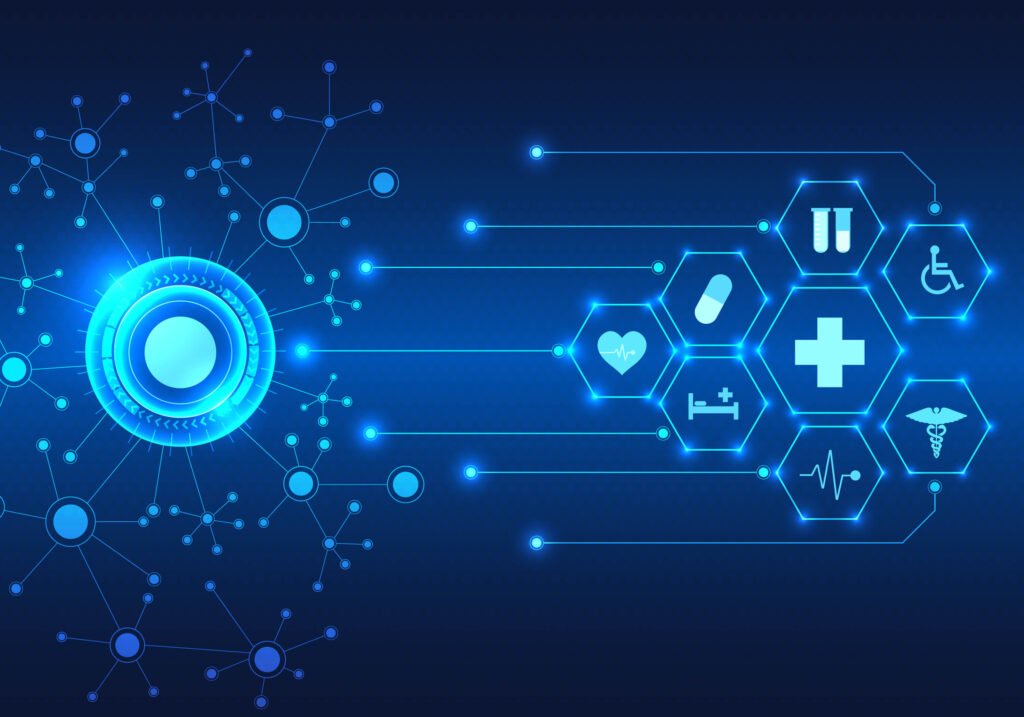
The integration of AI in healthcare, while promising, is not without its challenges and ethical considerations. One of the primary concerns is data privacy and security. AI algorithms require vast amounts of data to function effectively, and this data often includes sensitive patient information. Ensuring that this data is handled with the utmost care and in compliance with legal regulations is paramount. Any breach or misuse of patient data could have severe consequences, not only legally but also in terms of patient trust and the overall perception of AI in healthcare.
Another significant challenge is the potential for bias and inequality in AI-driven healthcare solutions. AI models are trained on existing data, and if this data contains biases, the AI algorithms may inadvertently perpetuate or even exacerbate these biases. For example, if an AI model for diagnosing a particular disease is trained primarily on data from one demographic group, it may perform poorly on patients from other demographic groups. This can lead to unequal access to care and disparities in health outcomes. Ensuring that AI models are trained on diverse and representative data and that they are continually monitored and adjusted for bias, is essential to achieving equitable healthcare.
The ethical considerations surrounding AI in healthcare extend to issues of transparency, accountability, and human oversight. Understanding how AI models arrive at particular diagnoses or treatment recommendations can be complex, and there may be concerns about the “black box” nature of some AI algorithms. Ensuring transparency in how AI models work, and maintaining human oversight in critical healthcare decisions, is vital. Additionally, there must be clear accountability mechanisms in place for any errors or adverse outcomes resulting from AI-driven healthcare interventions. Navigating these challenges and ethical considerations requires a collaborative and thoughtful approach, involving healthcare providers, technology experts, regulators, patients, and the broader community.
Benefits and Challenges of AI in Healthcare
| Area | Benefits | Challenges |
|---|---|---|
| Diagnostics | Enhanced accuracy | Data privacy |
| Treatment | Personalized care | Ethical considerations |
| Ethics | Standardized guidelines | Regulatory compliance |
| Data Privacy | Secure data handling | Potential breaches |
Data Privacy
Data privacy stands as a critical concern in the integration of AI in healthcare. AI algorithms require extensive access to personal and sensitive patient information, including medical histories, genetic data, and lifestyle details. While essential for personalized healthcare, this data must be handled with extreme care and security to prevent unauthorized access or misuse. Ensuring robust encryption, compliance with legal regulations, and ethical handling of patient data is a complex but vital task (source).
The challenge of maintaining data privacy extends to ethical considerations and the trust relationship between patients and healthcare providers. Patients must have confidence that their information is used responsibly and that their privacy is maintained. Any breach or inappropriate handling of data can erode this trust, impacting individual patient relationships as well as the broader perception of AI in healthcare. Transparent communication, clear consent protocols, and a commitment to ethical data practices are essential for building and maintaining trust.
The dynamic nature of technology and healthcare regulations presents an ever-changing landscape for data privacy. As AI continues to evolve and become more ingrained in healthcare practices, the intricacies of managing sensitive patient information will undoubtedly grow. The future of data privacy in AI-driven healthcare will require a multifaceted approach, balancing innovation with ethical stewardship. This includes the development of robust security protocols, adherence to evolving legal frameworks, and fostering a culture of transparency and accountability (source). Engaging patients in their data management and ensuring their understanding and consent will be vital. The path forward is one of collaboration and vigilance, where data privacy is not an afterthought but a foundational principle guiding the responsible and compassionate use of AI in healthcare.
Bias and Fairness
Bias and fairness in AI-driven healthcare are critical considerations that have far-reaching implications for patient care and health outcomes. AI models are trained on existing data, and if this data contains biases related to race, gender, age, or other factors, the AI algorithms may inadvertently perpetuate or even exacerbate these biases. For example, a study found that an algorithm used to guide healthcare decisions was less likely to refer Black patients for additional care compared to White patients, reflecting biases in the underlying data (source). This can lead to unequal access to care, misdiagnoses, and disparities in health outcomes, undermining the principles of fairness and equity in healthcare.
Addressing bias and ensuring fairness in AI-driven healthcare requires a comprehensive approach. It begins with the careful selection and scrutiny of training data to ensure that it is representative of diverse patient populations. Continuous monitoring and adjustment of AI models to detect and correct biases are also essential. Collaboration between healthcare providers, data scientists, ethicists, and community representatives can foster a more inclusive and fair approach to AI in healthcare. Transparency in how AI models are developed and implemented, along with clear accountability mechanisms, is vital to building trust and ensuring that AI-driven healthcare is fair and unbiased.
As technology advances and the integration of AI in healthcare becomes more widespread, the potential for bias and the importance of fairness will likely continue to grow. Navigating this complex terrain will require ongoing vigilance, collaboration, and commitment to ethical principles. By focusing on bias and fairness as core values, AI has the potential to transform healthcare in a way that is not only innovative and effective but also just, equitable, and reflective of the diverse needs and values of all patients.
Regulatory Compliance
Regulatory compliance is a complex and essential aspect of integrating AI into healthcare. As AI models become more prevalent in diagnosing, treating, and managing various medical conditions, ensuring that they comply with existing laws and regulations becomes paramount. This includes compliance with healthcare standards, data privacy laws, medical device regulations, and ethical guidelines. The U.S. Food and Drug Administration (FDA), for example, has been actively working on a regulatory framework to ensure the safety and effectiveness of AI-driven medical devices (source).
The process of aligning AI-driven healthcare with regulatory standards extends beyond mere compliance with existing laws. It involves a forward-thinking approach that anticipates future regulatory landscapes and adapts to evolving ethical considerations. As governments and international bodies work to develop guidelines that address the unique challenges posed by AI in healthcare, organizations must actively engage in dialogue with regulators, contribute to policy development, and invest in continuous education and training. This proactive engagement with the regulatory environment ensures that AI-driven healthcare not only meets current legal requirements but also aligns with emerging best practices and societal values.
The pursuit of unbiased and fair AI in healthcare is not a static goal but an ongoing journey. As AI continues to penetrate various aspects of healthcare, the challenge of eliminating biases and ensuring fairness becomes both more complex and more crucial. The future demands a proactive approach where biases are not merely corrected but prevented through thoughtful design and implementation. This includes engaging with diverse communities, understanding unique healthcare needs, and building AI models that are inherently inclusive. Education, open dialogue, and a shared commitment to equity will be key in shaping a healthcare system where AI serves all individuals, regardless of their background or circumstances. By embracing fairness as a fundamental principle, the healthcare industry can leverage AI to create a more compassionate and just system that recognizes and honors the inherent dignity and worth of every patient.
Ethical Considerations
Ethical considerations in AI-driven healthcare are paramount and encompass a wide range of issues, including patient autonomy, informed consent, transparency, accountability, and social justice. The integration of AI into healthcare decision-making processes raises questions about how to ensure that patients are fully informed and that their values and preferences are respected. The World Health Organization (WHO) has emphasized the importance of ethical considerations in AI in healthcare, outlining principles to guide responsible and patient-centered AI integration (source).
The ethical considerations in AI-driven healthcare also extend to the realm of data privacy and security. With AI models relying heavily on patient data, there is an imperative to ensure that this information is handled with the utmost confidentiality and integrity. This includes implementing robust security measures, providing clear guidelines on data usage, and ensuring that patients have control over their personal information. The intersection of ethics and data in AI-driven healthcare is a complex issue that requires ongoing vigilance, collaboration, and adherence to both legal regulations and moral principles. By prioritizing data ethics, healthcare providers can build trust with patients and create a foundation for responsible and compassionate AI-driven care.
The ethical landscape of AI in healthcare is a dynamic and multifaceted domain that will continue to unfold with technological advancements. As AI becomes more integrated into healthcare, the ethical dimensions will extend into new areas, such as personalized medicine, mental health, and global health equity. The future calls for a proactive and adaptive ethical framework that can respond to emerging challenges and opportunities. This includes fostering a culture of ethical innovation, where ethics is not a constraint but a catalyst for positive change. By embedding ethics at the core of AI development and implementation, healthcare can harness the power of AI to enhance care, improve outcomes, and uphold the principles of dignity, respect, and justice that are fundamental to the healthcare profession.
Current Trends of AI in Healthcare
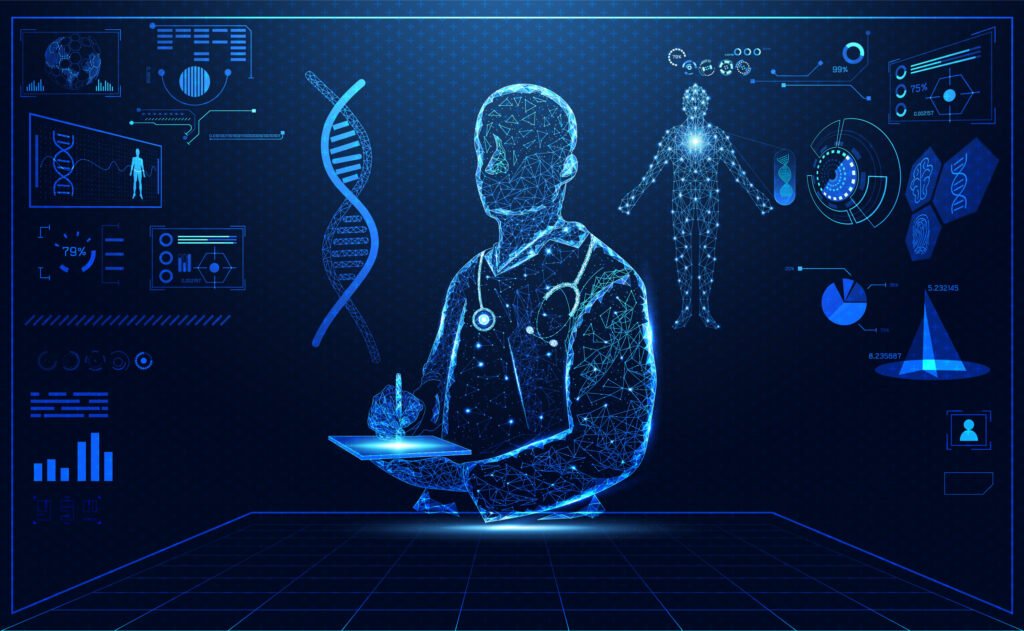
Key trends are emerging in the field of AI-driven healthcare that are poised to shape the future of medicine. One significant trend is the continued advancement of personalized medicine, where AI algorithms will play a crucial role in tailoring treatments to individual patient’s genetic makeup, lifestyle, and preferences. This trend is expected to revolutionize patient care, making it more targeted, effective, and patient-centered (source).
Another trend to watch is the expansion of telemedicine and remote monitoring, fueled by AI. The COVID-19 pandemic has accelerated the adoption of telemedicine, and this trend is expected to continue, with AI playing a vital role in enhancing virtual consultations, remote patient monitoring, and digital health management. This expansion will likely make healthcare more accessible and convenient, especially in underserved and remote areas.
Finally, the integration of AI in healthcare operations and administration is a trend that is expected to gain momentum moving forward. AI-powered tools for workflow management, resource optimization, and administrative automation are likely to become more prevalent, streamlining operations and reducing costs. This trend reflects a broader shift towards efficiency and sustainability in healthcare, where AI is leveraged to optimize resources and enhance the overall healthcare experience.
Integration of AI with Electronic Health Records (EHRs)
The integration of AI with Electronic Health Records (EHRs) is emerging as a significant trend to watch. EHRs contain a wealth of patient information, and the application of AI algorithms to this data can unlock new insights and efficiencies in patient care. AI-powered analytics can help healthcare providers identify patterns, predict outcomes, and personalize treatment plans based on comprehensive patient data. This integration is expected to enhance clinical decision-making, improve patient outcomes, and streamline healthcare workflows (source).
The integration of AI with EHRs also presents opportunities for enhancing collaboration and coordination across different healthcare providers. By enabling real-time access to comprehensive patient data, AI can facilitate more informed and timely communication between physicians, specialists, nurses, and other healthcare professionals. This interconnected approach can lead to more cohesive care plans, reduce duplication of tests and procedures, and ensure that all members of the healthcare team are working from the same information. The potential for AI to foster a more collaborative and patient-centered healthcare system through integration with EHRs represents a promising direction for future innovation and improvement in healthcare delivery.
With each stride in technological innovation and the ongoing digital evolution within the healthcare landscape, AI’s potential to enrich EHRs and cultivate a more adaptive, individualized, and efficient healthcare system is becoming an achievable reality. This trend signifies a broader transition towards an analytics-driven healthcare paradigm, where AI’s ability to harness patient data opens doors to a future that synergizes innovation with patient-focused care, resonating with the values and aspirations of the healthcare community.
AI-Powered Mental Health Support
AI-powered mental health support is emerging as a vital trend, reflecting a growing recognition of the importance of mental health and the potential for technology to enhance support and treatment. AI-driven chatbots, virtual therapists, and predictive analytics are being developed to provide personalized mental health support, assess risk factors, and deliver timely interventions. These tools can supplement traditional mental health care, providing accessible and cost-effective support to a broader population. A study by Stanford University has shown promising results in using AI to analyze and predict mental health conditions based on various data inputs (source).
The potential of AI-powered mental health support extends beyond individual care and into broader public health initiatives. By utilizing AI algorithms to analyze population-level data, healthcare systems can identify trends, risk factors, and emerging mental health challenges within communities. This data-driven approach enables targeted interventions, public awareness campaigns, and the development of support programs tailored to specific community needs. The integration of AI into mental health support represents not just a technological advancement but a transformative shift towards a more proactive and community-centered approach to mental health care. This trend underscores the potential for AI to contribute to a more resilient and compassionate mental health ecosystem that recognizes and responds to the complex interplay of individual and societal factors.
As societal understanding of mental health evolves and technology continues to advance, AI is poised to play a pivotal role in expanding access to mental health resources. This trend signifies a move towards a more integrated approach to health and well-being, where mental health is not an isolated concern but an essential part of a holistic healthcare system. By leveraging AI’s capabilities, the healthcare community can create innovative solutions that are not only effective but also attuned to the diverse and individualized needs of those seeking mental health support.
Wearable AI Devices
Wearable AI devices are poised to be a transformative trend in healthcare. These devices, ranging from smartwatches to specialized medical wearables, are equipped with AI algorithms that can monitor vital signs, detect anomalies, and provide real-time feedback to both patients and healthcare providers. The integration of AI with wearable devices allows for continuous monitoring and personalized insights, enhancing preventive care and enabling timely interventions. The market for wearable AI devices in healthcare is seeing rapid growth (source). These wearable AI devices show the potential to revolutionize patient care and engagement.
By aggregating data from wearable devices across populations, healthcare systems can gain insights into broader health trends, identify areas of concern, and develop targeted interventions and wellness programs. This collective approach to health monitoring represents a shift towards a more interconnected and community-oriented healthcare paradigm. Wearable AI devices are not just personal health tools but part of a larger ecosystem that leverages technology to create a more responsive, adaptive, and inclusive healthcare environment. The integration of AI with wearable technology is paving the way for a future where healthcare is personalized and attuned to the collective well-being of communities, reflecting a holistic vision of health that recognizes the interconnectedness of individual and societal factors.
As the boundaries between technology and healthcare continue to blur, wearable AI devices are becoming an integral part of a new era of patient care. This trend signifies a move towards a more proactive and personalized approach to health, where continuous monitoring and real-time insights empower patients to take control of their well-being. By harnessing the capabilities of AI, the healthcare community can create solutions that are innovative and responsive to individual needs, fostering a healthcare system that prioritizes prevention, engagement, and patient autonomy.
Global Expansion
Global expansion of AI-driven healthcare is a significant trend to watch, reflecting the growing recognition of AI’s potential to enhance healthcare delivery across diverse regions and healthcare systems. From developed nations with advanced healthcare infrastructures to emerging economies with unique healthcare challenges, AI is being leveraged to improve diagnostics, treatment, accessibility, and efficiency. A report by PwC highlights the potential for AI to transform healthcare globally, with particular emphasis on its ability to address healthcare disparities and enhance care in underserved regions (source).
The global expansion of AI-driven healthcare also opens doors to innovative collaborations and shared learning across borders. By connecting healthcare professionals, researchers, and technologists from various parts of the world, AI fosters a global community of practice that can collectively address healthcare challenges. This interconnected approach allows for the exchange of best practices, the development of shared solutions, and the leveraging of diverse expertise to drive healthcare innovation. The global reach of AI is not just about extending services but about creating a collaborative ecosystem that transcends geographical boundaries. This trend signifies a move towards a more interconnected and synergistic global healthcare landscape, where technology serves as a bridge, enabling collaboration, enhancing understanding, and fostering a shared commitment to improving health outcomes for all.
As AI continues to permeate various aspects of healthcare, its potential to bridge gaps and create a more unified global healthcare system becomes evident. This expansion is not merely about implementing technology but about crafting solutions that resonate with diverse cultures, economies, and healthcare needs. By focusing on inclusivity, adaptability, and collaboration, AI has the potential to redefine healthcare on a global scale, creating a landscape that is not only technologically advanced but also compassionate, equitable, and attuned to the multifaceted needs of communities around the world.
Future Prospects and Predictions of AI in Healthcare

The future prospects and predictions for AI in healthcare are both exciting and transformative. As AI continues to evolve, its integration into various aspects of healthcare is expected to deepen, leading to more personalized, efficient, and accessible care. Predictive analytics, real-time monitoring, virtual healthcare assistance, and AI-driven research are just a few areas where significant advancements are anticipated. A report by McKinsey & Company predicts that AI could add up to $100 billion annually to the value of the healthcare industry in the next decade, reflecting its immense potential to enhance care and drive innovation (source).
The challenges and considerations for the future of AI in healthcare are multifaceted and will require ongoing collaboration, innovation, and vigilance. Ensuring that AI-driven healthcare is ethical, equitable, secure, and aligned with patient needs and societal values will be key considerations. Navigating regulatory landscapes, fostering interdisciplinary collaboration, and maintaining a focus on patient-centered care will be essential to realizing the full potential of AI in healthcare.
Looking to the future, the prospects for AI-driven healthcare are bright and hold immense promise for transforming healthcare on a global scale. As technology advances, as collaboration grows, and as our understanding of the potential risks and benefits of AI deepens, the possibilities for AI to enhance healthcare in innovative, patient-centered, and socially responsible ways become a tangible reality. This future reflects a broader shift towards a more connected, responsive, and innovative healthcare landscape, where AI is leveraged to enhance care, empower patients, and foster a more equitable and accessible global healthcare community.
Collaboration between AI and Human Experts
The collaboration between AI and human experts in healthcare is a vital aspect of future prospects and predictions, reflecting a growing recognition that AI is not a replacement for human expertise but a powerful tool that can enhance and extend human capabilities. AI algorithms can analyze vast amounts of data, identify patterns, and provide insights that can support human experts in making more informed and timely decisions. A study by MIT highlights the potential for AI-human collaboration to improve diagnostic accuracy and enhance patient care (source).
The challenge of fostering collaboration between AI and human experts lies in ensuring that this collaboration is seamless, transparent, and aligned with ethical and professional standards. Ensuring that AI models are understandable, that human experts maintain oversight and control, and that collaboration enhances rather than diminishes the human aspects of care will be key considerations. Building trust, fostering interdisciplinary collaboration, and providing training and support for healthcare professionals in working with AI will be essential to realizing the full potential of AI-human collaboration.
As AI continues to mature, its role as a complementary force to human expertise becomes more defined. This collaboration is not just about technology and algorithms; it’s about creating a synergy where human empathy, judgment, and experience are amplified by AI’s computational power and analytical capabilities. By focusing on a partnership that respects the unique strengths of both AI and human experts, healthcare can move towards a model that is more efficient and precise as well as more empathetic, ethical, and attuned to the human experience. This harmonious collaboration has the potential to redefine healthcare, making it a more integrated, personalized, and compassionate endeavor.
Ethical AI Frameworks
Ethical AI frameworks in healthcare are emerging as a critical aspect of future prospects and predictions, reflecting the growing recognition of the importance of ethics in AI-driven healthcare. As AI continues to advance and integrate into various aspects of healthcare, the need for robust and comprehensive ethical frameworks becomes paramount. These frameworks guide the responsible development, implementation, and oversight of AI, ensuring that it aligns with ethical principles such as transparency, fairness, privacy, and social justice. The World Health Organization (WHO) has outlined guidelines for ethical AI in healthcare, emphasizing the importance of human rights, equity, and global collaboration (source).
As technology advances and as the healthcare community continues to embrace AI, the potential for ethical AI frameworks to shape a more responsible, transparent, and equitable healthcare system becomes a tangible reality. These frameworks reflect a broader shift towards responsible innovation, where ethics is not an afterthought but a foundational principle guiding AI integration. By focusing on ethical AI frameworks, the healthcare industry can move towards a future that is not only innovative and effective but also responsible, compassionate, and aligned with the values and needs of patients and society.
These frameworks are not just about rules and regulations; they are about creating a culture where ethics, transparency, and human dignity are at the forefront of technological advancement. The commitment to ethical AI frameworks is a testament to the healthcare community’s dedication to harnessing the power of AI in a way that respects human values, promotes equity, and enhances the overall well-being of patients and society.
Investment in Research and Development
Investment in research and development (R&D) for AI in healthcare is a critical aspect of future prospects and predictions, reflecting the growing recognition of the importance of innovation, exploration, and continuous improvement in AI-driven healthcare. R&D investment fuels the discovery of new AI algorithms, applications, and technologies that can enhance diagnostics, treatment, patient engagement, and healthcare operations. A report by Grand View Research highlights the increasing investment in healthcare AI R&D, projecting significant growth in the global healthcare AI market, driven by technological advancements and increased funding (source).
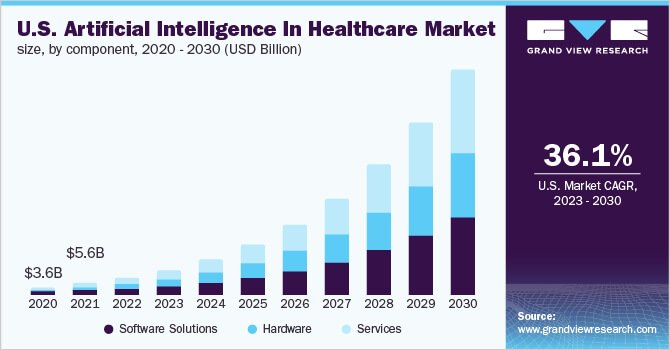
Image from Grand View Research
The process of channeling investment into R&D for AI in healthcare is not without its complexities. It demands a keen understanding of both the technological landscape and the specific needs of healthcare systems across different regions and demographics. The integration of AI into healthcare requires technological innovation, ethical considerations, regulatory compliance, and alignment with patient-centered care. Strategic investment in R&D must also consider the global expansion of AI-driven healthcare, ensuring that solutions are adaptable and culturally sensitive. By focusing on these aspects, investment in R&D can lead to AI solutions that are cutting-edge, responsible, inclusive, and attuned to the real-world challenges and opportunities of healthcare.
The role of investment in research and development (R&D) for AI becomes a central pillar in shaping the future. This investment is not merely a financial endeavor but a commitment to unlocking the untapped potential of AI in enhancing patient care, streamlining operations, and driving medical innovation. The future beckons a healthcare system where AI is seamlessly integrated, where research fuels breakthroughs, and where development leads to tangible improvements in healthcare outcomes. The strategic alignment of R&D investment with the core values and needs of healthcare paves the way for a new era of medical excellence, accessibility, and personalized care, setting the stage for a future where technology and human ingenuity work in harmony for the betterment of all.
Conclusion
The integration of AI in healthcare represents a profound and transformative shift in the way healthcare is delivered, experienced, and envisioned. From enhancing diagnostics and personalizing treatment to driving global expansion and fostering ethical AI frameworks, the landscape of AI-driven healthcare is rich with potential and challenges. The benefits and opportunities are vast, offering a glimpse into a future where healthcare is more accessible, efficient, personalized, and innovative. The collaboration between AI and human experts, investment in research and development, and focus on ethical considerations reflect a comprehensive and responsible approach to leveraging AI in healthcare.
As technology continues to advance and as the healthcare community continues to embrace AI, the prospects for AI-driven healthcare are bright and hold immense promise for shaping a healthcare system that is not only technologically advanced but also aligned with the needs, values, and aspirations of patients and society. The trends to watch in 2023, future prospects and predictions, and the focus on benefits and opportunities provide a roadmap for a future where AI is leveraged to enhance care, drive discovery, and foster a more dynamic and innovative healthcare landscape.
The journey towards AI-driven healthcare is complex, requiring collaboration, innovation, ethics, and a patient-centered approach. By focusing on these key aspects and by embracing the potential and challenges of AI, the healthcare industry can move towards a future that is transformative, effective, and aligned with the broader goals of healthcare and society.
AI in Healthcare FAQ
AI is being used in healthcare to enhance diagnostics, personalize treatment, enable early disease detection, and streamline operations.
Trust in AI in the medical field varies, with growing acceptance among professionals, but concerns remain regarding ethics and data privacy.
AI can improve patient care by providing personalized treatment plans, reducing human error, and facilitating continuous remote monitoring.
AI Healthcare refers to the integration of artificial intelligence technologies into healthcare systems to improve efficiency, accuracy, and patient outcomes.
AI is important in healthcare because it offers the potential to transform patient care, reduce costs, and enable healthcare providers to make more informed and timely decisions.
Jump to our Latest News





